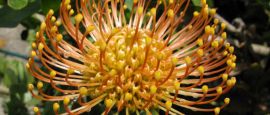Santana is arguably the most visited village on the island. Visitors come here to imbibe the quaint rural atmosphere and marvel at its triangular-shaped houses, or palheiros.
Madeira things to see and do
Tourist offices
Address: 16 Avenida Arriaga, Funchal, Madeira, 9004-519, Portugal
Tel: +351 291 211 902.
Opening Hours: Mon-Fri 0800-2000, Sat & Sun 0900-1530.
www.visitmadeira.pt
The island's highest peak, Pico Ruivo (1,862m/6,109ft) can be reached in under an hour via a paved path from a parking area to the north (Achada do Texeiro), and, not surprisingly, offers spectacular views. Even easier to conquer is the third-highest peak, Pico do Arieiro (1,818m/5,965ft) – it's road all the way, with a bar, restaurant and gift shop at the top.
The deep waters around Madeira offer some of the best whale watching in the region. The archipelago was once an important outpost for the deadly whaling industry, but since a moratorium on hunting the mammals in 1981, the waters are once again teeming with whales – and dolphins. Tours depart from various locations throughout Madeira.
The levadas are a network of ancient irrigation channels stretching some 2,150km (1335 miles) across the island's slopes from the north of the island. Today, while they continue to provide water to remote valleys, they also represent a supply of ready-made walkways for tourists.
The cable car from Funchal to Monte leads to the Nossa Senhora de Monte church. On 15 August, it becomes a centre of pilgrimage when worshippers climb the 74 steps on their hands and knees.
Madeira is renowned for its fortified wines: Malvasia, Bual, Verdelho and Sercial. Most countries limit the use of the term 'Madeira' to wines that come from the island of Madeira, to which the European Union grants Protected Designation of Origin (PDO) status. The island also produces a light, white, table wine (Vinho Verde), which is superb with salads, and is increasingly producing red table wines in the north of the island. The famous Madeira Wine Festival takes place annually in September.
Originally used as a speedy means of descent for villagers, toboggans are today mainly used to carry tourists. Driven by two men (carreiros) dressed in white, with straw hats and black rubber boots that are used as brakes, they use ropes to control the wide, two-person wicker baskets which are mounted on wooden runners. Runs start in Monte (accessible by cable car) and descend rapidly to Livramento, a suburb of Funchal.
There are three fine golf courses in the Madeira archipelago: the 27-hole Campo de Golfe do Santo da Serra (www.santodaserragolf.com) an 18-hole Palheiro course (www.palheirogolf.com), and Porto Santo (www.portosantogolfe.com). Construction halted in 2003 on a fourth championship golf course being built in Ponta do Pargo that was designed by famous golfer Nick Faldo.
Machico is the original capital of Madeira and is home to a magnificent 15th-century parish church, the Chapel of Miracles (a place of pilgrimage) and a small but picturesque 18th-century fort.
The Madeiran capital is set on a natural sweeping bay, backed by richly vegetated slopes that rise to a skyline of rugged peaks. The town is home to a remarkable 16th-century cathedral, the Museum of Sacred Art (www.museuartesacrafunchal.org) and Botanical Gardens – five hectares (12 acres) of terraced hillside, planted with species from around the globe.
Do you have any Feedback about this page?
© 2026 Columbus Travel Media Ltd. All rights reserved. No part of this site may be reproduced without our written permission, click here for information on Columbus Content Solutions.








 You know where
You know where